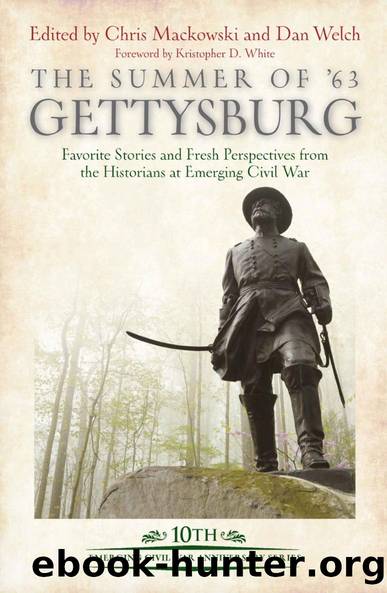The Summer of '63: Gettysburg by Chris Mackowski Dan Welch

Author:Chris Mackowski, Dan Welch [Chris Mackowski, Dan Welch]
Language: eng
Format: epub
Tags: Nonfiction, History, Modern, 19th Century, Americas, United States, Civil War Period (1850-1877)
ISBN: 9781954547056
Publisher: Savas Beatie
Published: 2021-08-15T04:00:00+00:00
Jackson had learned a hard lesson at the first battle of Kernstown in March 1862, when faulty intelligence about the enemyâs position led to his only true battlefield defeat. Thereafter, Jackson made an effort to discern his opponentâs dispositions. In fact, it was in the midst of one such attempt at gathering information that Jackson was accidentally shot by his own men at Chancellorsville. To assume he would have stormed Cemetery Hill without any idea of what lay beyond it places too much emphasis on Jacksonâs aggressiveness at the expense of his good sense as a tactician.
A closer examination of the way Jackson handled his corps in the hours before his famed wounding at Chancellorsville is essentially a mirror image of Ewellâs actions on July 1 at Gettysburg.
Jackson, like Ewell, had just driven the Federal XI Corps from the field. He too had engaged two of his three divisions at hand and both divisions had lost cohesion. The two corps commanders both had listened to the concerns of their division commanders and called upon fresh reserves to execute the next phase of action, while at the same time they tried to gain a clear understanding of what enemy forces lay ahead. Finally, the two men had not just haphazardly run headlong into the waiting teeth of Federal artillery. While Richard Ewell is decidedly not Stonewall Jackson, Ewell and Jackson mirrored one another on their most famous and trying days of the American Civil War.
At the end of the day Richard Ewell will remain the scapegoat of many armchair generals. Sadly for his legacy, he did not take Cemetery Hill and failed to secure Culpâs Hill in the process. While these results weigh heavily on his shoulders, one must consider that Robert Rodesâs disjointed assaults and long casualty list, coupled with Jubal Earlyâs recalcitrant attitude on July 1 and the failure to bring Johnsonâs division along with the rest of the corps, all created the perfect set of circumstances for the Federal army to hold the heights south of Gettysburg, and to doom the reputation of one southern officer forever more.
Selected Bibliography
Bean, W. G. Stonewallâs Man: Sandie Pendleton. Chapel Hill, NC.: University of North Carolina Press, 2000.
Busey, John W. and David G. Martin, Regimental Strengths and Losses at Gettysburg. East Windsor, NJ.: Longstreet House, 2005.
Coddington, Edwin B. The Gettysburg Campaign: A Study in Command. New York: Touchstone, 1997.
Collins, Darrell L. Major General Robert E. Rodes of the Army of Northern Virginia. El Dorado, CA.: Savas Beatie, 2008.
Douglas, Henry Kyd. I Rode with Stonewall: The War Experiences of the Youngest Member of Jacksonâs Staff. Chapel Hill, NC.: University of North Carolina Press, 2013.
Early, Jubal A. Jubal Earlyâs Memoirs: Autobiographical Sketch and Narrative of the War Between the States. Baltimore, MD.: Nautical & Aviation Publishing Company of America, 1989.
Gallagher, Gary W. Stephen Dodson Ramseur: Leeâs Gallant General. Chapel Hill, NC.: University of Carolina Press, 1985.
Glatthaar, Joseph T. General Leeâs Army: From Victory to Collapse. New York: Free Press, 2008.
Gottfried, Bradley M. Brigades of Gettysburg: The Union and Confederate Brigades at the Battle of Gettysburg.
Download
This site does not store any files on its server. We only index and link to content provided by other sites. Please contact the content providers to delete copyright contents if any and email us, we'll remove relevant links or contents immediately.
The World Almanac and Book of Facts 2021 by Sarah Janssen(863)
The emperor wears no clothes by Jack Herer(379)
The Way Home by Unknown(346)
The Crises of Civilization by Dipesh Chakrabarty(324)
Darius in the Shadow of Alexander by Pierre Briant(281)
History of India: A History In 50 Events by Hourly History(280)
Hidden Links by Zac Sangeeth & Sangeeth Varghese(267)
The History of Human Marriage by Edward Westermarck(258)
A Military History of the Cold War, 1962â1991 by Jonathan M. House(253)
Prehistoric Europe by Champion Timothy. Whittle Alasdair. Shennan Stephen. Gamble Clive(245)
Flood Legends: Global Clues of a Common Event by Charles Martin(235)
History of the Jews: An Enthralling Guide from Ancient Times to the Present (Religion in Past Times) by Wellman Billy(228)
Chinese History: 500 Interesting Facts About China (Curious Histories Collection) by Ahoy Publications(213)
Big Tent by Mallory Factor(208)
The Education of Historians for Twenty-First Century by Thomas Bender; Philip F. Katz; Colin A. Palmer(205)
Mark Of The Scots - Cl by Duncan A. Bruce(200)
The Philosophy of Historiography by John Lange(199)
Ancient Roman Sports, A-Z : Athletes, Venues, Events and Terms by David Matz(192)
Other Pasts, Different Presents, Alternative Futures by Jeremy Black(191)
